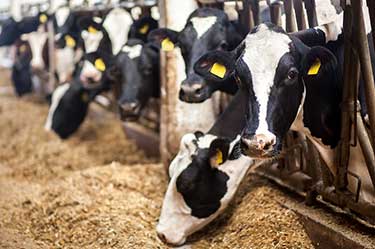Antimicrobial Stewardship for Cattle

Antimicrobial stewardship and its role within your large animal veterinary practice
Antimicrobial resistance (AMR) remains a worldwide health concern and a top priority for the World Health Organization, Centers for Disease Control and Prevention (CDC) and other global healthcare entities. Inappropriate treatment with antibiotics continues to challenge healthcare professionals, as misuse and bacterial resistance continues to rise.
In addition to side effects, adverse drug reactions, morbidity and mortality, the overprescribing and misuse of antibiotics have contributed to antibiotic resistance, identified as one of the most serious threats to public health, not to mention the staggering economic impact.
As healthcare facilities begin to implement antibiotic stewardship programs to optimize treatment of infections and reduce the adverse effects of antibiotic use, many of the same principles can be applied to animal healthcare and veterinary practices, as well.
Identifying the problem of antibiotic resistance within food animals
The CDC categorized antibiotic resistant threats into three levels: urgent, serious and concerning. Two organisms classified as “serious,” Campylobacter and Salmonella, have origin in animals.
The CDC report identified 310,000 drug-resistant Campylobacter infections per year, resulting in 13,000 hospitalizations and 120 deaths. Non-typhoidal Salmonella caused 1.2 million infections per year and 23,000 hospitalizations, resulting in $365 million in direct medical costs.
This can be troubling for food animal producers. In fact, U.S. beef exports reported a 12% gain in 2017, following a 13% gain in 2016. So how can beef and dairy cattle producers maintain the health, reproductive efficiency and survival rates of their herds in light of antimicrobial resistance, the Veterinary Feed Directive and consumer preferences?
Implementing an antimicrobial stewardship plan within your practice
As veterinarians, you have the opportunity to help prevent antibiotic resistance. The CDC identifies four core actions to fight back.
- Preventing infection through immunization, hand washing, improved food production and processing, educating farm employees and only using antibiotics as necessary and when directed. Within your practice, help producers establish their own herd health programs focusing on vaccinations, parasite control, nutrition and husbandry.
- Tracking data on antibiotic-resistant infections to develop strategies to prevent the bacteria from spreading.
- Improving antibiotic prescribing and stewardship through responsible prescribing practices and stoppage of unnecessary antibiotic use. It means using/prescribing antibiotics only when needed, choosing the right ones for treatment and administering in the right way every time.
- Developing new drugs and diagnostic tests to treat disease and track the development of resistance.
The American Association of Bovine Practitioners outlines five key elements to implementing antimicrobial stewardship plans within beef and dairy operations:
- Leadership commitment to be responsible for the entire cycle of bacterial disease management, which includes the diagnosis of bacterial disease; consideration of non-antibiotic alternatives to prevent, control or treat; judicious use of antimicrobial drugs; and re-evaluation of the need for antimicrobial use.
- Veterinarians taking responsibility to continually seek drug expertise and new information about the use of antimicrobial drugs.
- Bovine practitioners tracking antimicrobial drug use through the review of treatment records, dispensing history and protocols.
- Supporting efforts to report drug use across farms in your practice area to benchmark and compare usage data.
- Taking action among clients to educate about AMR and identify better practices within individual farms.
In the article “Vaccination to reduce antimicrobial resistance,” published in the November 8, 2017 edition of The Lancet, authors Amy Sarah Ginsburg and Keith P. Klugman write, “…vaccination to reduce antimicrobial use and resistance might be an easier alternative in most countries. Antibiotic-resistant bacteria confound management choices, produce treatment failures and increase healthcare costs. Decreasing antimicrobial resistance through a strategy of expanded vaccination has shown promising results.”
By helping clients develop sound AMR protocols, you are helping them decrease the incidence and severity of infectious diseases while reducing long-term treatment costs and production losses.
For more information about beef and dairy cattle vaccination programs, refer to this article from American Cattlemen.
Contact your Covetrus representative for more information at 855.724.3461 or online.
Sources:
https://www.cdc.gov/antibiotic-use/healthcare/implementation/core-elements.html
https://www.cdc.gov/foodsafety/challenges/antibiotic-resistance.html
https://www.cdc.gov/drugresistance/threat-report-2013/pdf/ar-threats-2013-508.pdf#page=61
https://www.drovers.com/article/2018-outlook-beef-demand-vs-growing-cattle-supplies
https://www.fda.gov/AnimalVeterinary/DevelopmentApprovalProcess/ucm449019.htm
http://aabp.org/resources/AABP_Guidelines/AntimicrobialStewardship-7.27.17.pdf
https://www.thelancet.com/journals/langlo/article/PIIS2214-109X(17)30364-9/fulltext
http://www.americancattlemen.com/articles/beef-and-dairy-cattle-vaccination-programs
Need Regulatory Assistance
If you need help with regulatory or licensing issues, we're happy to help. We have a wide variety of resources to help you when issues arise.

Careers
Are you looking for a place to let your talents shine? At Covetrus, we help our practitioner customers better serve their patients and take pride in providing the best customer experience possible. Search our open positions to see our available opportunities.
Newsletter
Stay current with what’s going on with Covetrus, subscribe to receive our newsletter and email communications. Subscribers will receive the latest information in practice management, sales and marketing, animal health, and more.


Leave a comment